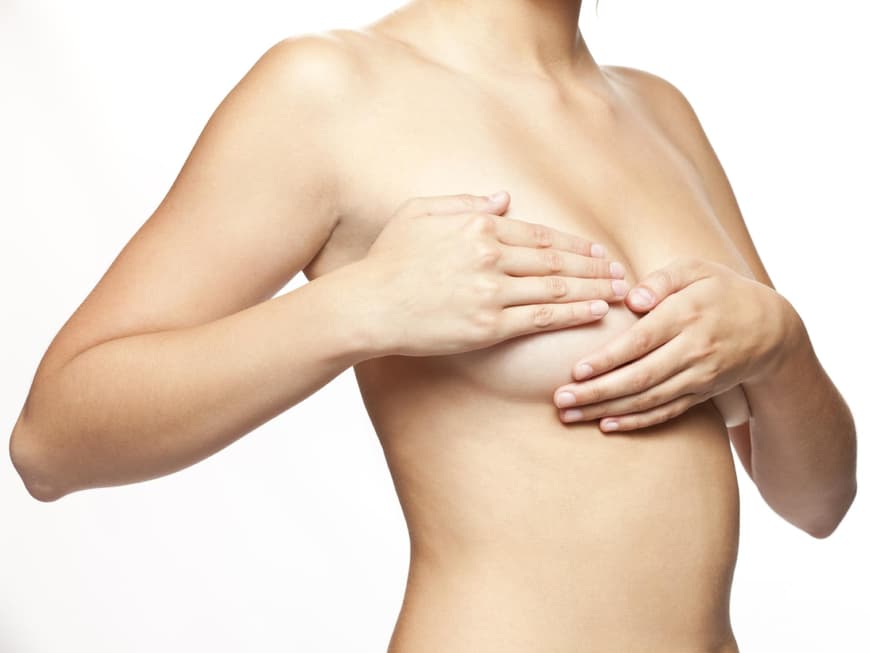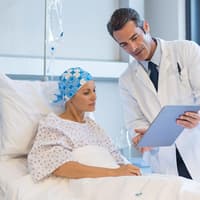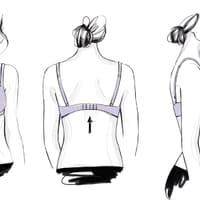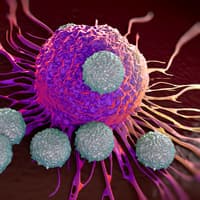

There's no question about it: a breast cancer diagnosis is a shock for every woman, and it throws life into complete disarray. Our expert, Dr. Susanne Weg-Remers, gives advice on how to deal with this situation. And she knows that the chances of recovery are good thanks to modern treatment methods: The cure rate is 80 percent.
What exactly is breast cancer?
As is always the case with cancer, the first step is an error in the genetic information of a cell. Only if this first cancer cell makes it through the body's own controls can it divide further. Breast cancer develops in the tissue of the mammary gland: in the milk ducts or glandular lobules. If such a tumor continues to grow, it eventually invades the surrounding tissue. This is known as invasive breast cancer.
At what age does it occur most frequently?
A good two thirds of women are older than 50; most have already gone through the menopause. Breast cancer at a younger age is rare, but not impossible.
What are the risk factors for development?
We now know that obesity and lack of exercise can play a role. People who drink a lot of alcohol also increase their risk. Female hormones play an important role: those who reach puberty very early and go through the menopause late, and who then possibly also take hormones for hot flushes and similar complaints, are slightly more likely to develop the disease. Women who have had children and have breastfed for longer, on the other hand, have a lower risk. It is now known that hereditary risk genes also play a role in five to ten out of every hundred breast cancer patients.
Can I do anything to prevent breast cancer?
Unlike other types of cancer, which are more dependent on lifestyle than hormones, there are unfortunately few options for prevention. I can only advise women who are considering hormone replacement therapy to avoid it if possible or to keep it as short as possible. They should also be careful with phytohormones.
When should you have a mammogram?
From the age of 50, mammography is covered by health insurance: you will be invited to a specialized mammography center every two years until your 70th birthday. What is important, of course: Can you feel a lump? Has the breast changed? If so, we at the Cancer Information Service advise all women not to wait until their next screening appointment. The situation is different if you have close relatives with breast cancer or ovarian cancer. In this case, you should ask your gynecologist about the best age to start screening.
What if I have been diagnosed with breast cancer?
It naturally takes a while to come to terms with the shock. Take your time to do so. And then you should inform yourself thoroughly about the treatment options. Make a note of your questions before the consultation. You may want to take your partner with you. It is normal for you to slip into a low at first. If you cannot get out of this alone, a psycho-oncologist or a self-help group can help. If several doctors are involved, find one who will coordinate everything.
Is surgery always performed for localized breast cancer?
Yes, although how much tissue is removed depends on the size and location. The aim is breast-conserving therapy. A mastectomy, i.e. complete removal of the breast, has become rare. The armpit area is also operated on as gently as possible: Recently, the sentinel lymph node, which is usually the first to develop metastases, has been detected. If it does not contain any cancer cells, the all-clear can usually be given. It is then very unlikely that the tumor has spread to more distant lymph nodes.
What are the chances of recovery today?
Much higher than a few decades ago. If breast cancer is detected early, almost all patients can expect to be cured. However, individual fates can only be determined to a limited extent from the statistics: There are still women for whom doctors can stop the disease but not cure it completely.
What does the therapy look like? Are there any new drugs?
Surgery is still very important. Radiotherapy can protect against relapses, especially if the breast is preserved. If the tumor grows depending on female hormones, anti-hormonal medication in the first few years after diagnosis protects against a relapse. Depending on the situation, chemotherapy also increases this protection. An increasingly important role is being played by drugs that specifically target particular properties of the cancer tissue: These can be antibodies that also protect against relapse after surgery. They can also be targeted drugs that slow down tumor growth when the disease returns.
And how exactly does chemotherapy work today?
Depending on the case, it either follows - or precedes - surgery. As a rule, outpatient infusions are administered in several cycles. Unfortunately, chemotherapy often has side effects. Medication can alleviate nausea. One problem is hair loss. Experiments are being carried out with cooling caps to prevent the medication from reaching the hair roots. In the case of a hormone receptor-positive tumor, anti-hormones can also be administered after the operation - in the form of tablets or monthly depot injections. These are intended to specifically block the effect of oestrogen and reduce the risk of relapse. It also plays a role whether the patient is still pre-menopausal or already past the menopause.
And when does radiotherapy make sense?
Radiotherapy is used when there is a high risk of recurrence. The equipment has been continuously improved in recent years, so that radiation can be delivered with greater precision.
And if a woman already has metastases?
If there are distant metastases, for example in the bones, advanced breast cancer can no longer be cured. However, there are drugs that can delay progression and help to live with the metastases for longer.
What does it depend on whether the cancer is cured?
What you can do yourself: make sure you maintain a normal weight and get plenty of exercise. However, we know that the chances of recovery decrease if cancer cells detach from the actual tumor and resettle elsewhere in the body. This cancer tissue is called metastasis. But even for women in this situation, there are now good therapies that can at least slow down the disease, often for years!
Is cancer a contagious disease?
Unfortunately, we still hear this question quite often at the Cancer Information Service. No, cancer is not contagious! It can be terrible for those affected if they are shunned by family, friends or work colleagues out of false shyness.
Is it true that cancer feeds on sugar?
No, even though this is often claimed. A normal, balanced diet is completely sufficient. Some alleged cancer diets can even be harmful because they are far too one-sided. Cancer cannot be starved, not even by giving up sugar, carbohydrates or fat.






